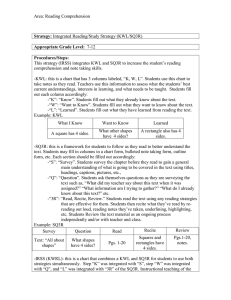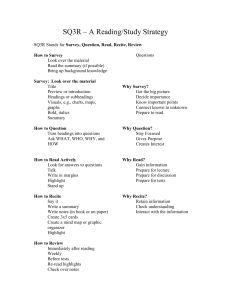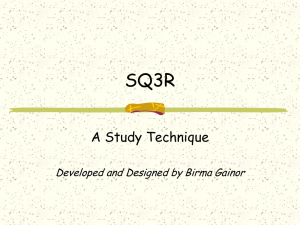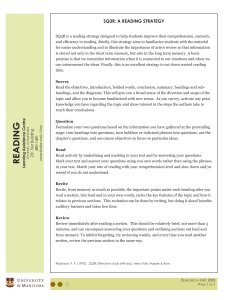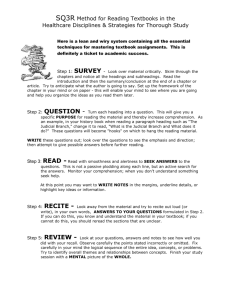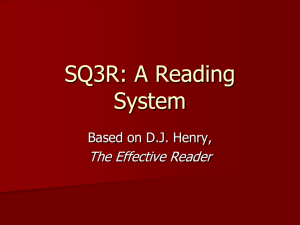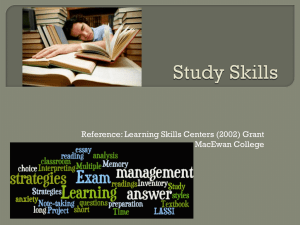Reading Comprehension comprehension and note taking skills.
advertisement
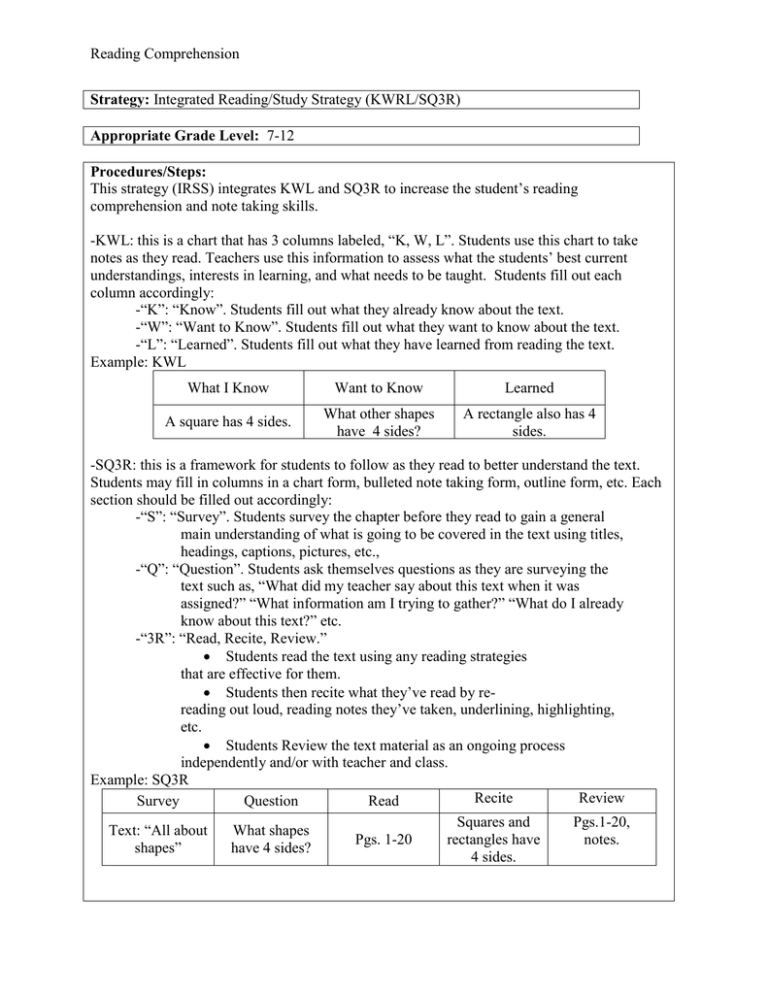
Reading Comprehension Strategy: Integrated Reading/Study Strategy (KWRL/SQ3R) Appropriate Grade Level: 7-12 Procedures/Steps: This strategy (IRSS) integrates KWL and SQ3R to increase the student’s reading comprehension and note taking skills. -KWL: this is a chart that has 3 columns labeled, “K, W, L”. Students use this chart to take notes as they read. Teachers use this information to assess what the students’ best current understandings, interests in learning, and what needs to be taught. Students fill out each column accordingly: -“K”: “Know”. Students fill out what they already know about the text. -“W”: “Want to Know”. Students fill out what they want to know about the text. -“L”: “Learned”. Students fill out what they have learned from reading the text. Example: KWL What I Know Want to Know Learned A square has 4 sides. What other shapes have 4 sides? A rectangle also has 4 sides. -SQ3R: this is a framework for students to follow as they read to better understand the text. Students may fill in columns in a chart form, bulleted note taking form, outline form, etc. Each section should be filled out accordingly: -“S”: “Survey”. Students survey the chapter before they read to gain a general main understanding of what is going to be covered in the text using titles, headings, captions, pictures, etc., -“Q”: “Question”. Students ask themselves questions as they are surveying the text such as, “What did my teacher say about this text when it was assigned?” “What information am I trying to gather?” “What do I already know about this text?” etc. -“3R”: “Read, Recite, Review.” Students read the text using any reading strategies that are effective for them. Students then recite what they’ve read by rereading out loud, reading notes they’ve taken, underlining, highlighting, etc. Students Review the text material as an ongoing process independently and/or with teacher and class. Example: SQ3R Recite Review Survey Question Read Text: “All about shapes” What shapes have 4 sides? Pgs. 1-20 Squares and rectangles have 4 sides. Pgs.1-20, notes. Reading Comprehension -IRSS (KWRL): this is a chart that combines a KWL and SQ3R for students to use both strategies simultaneously. Step “K” was integrated with “S”, step “W” was integrated with “Q”, and “L” was integrated with “3R” of the SQ3R. Instructional teaching of the text must always follow IRSS. Example: KWRL Learned What I know 1. Survey: Text: “All about shapes”. 2. Know: I know that a square has 4 sides. Want to Know 1: Question: What other shapes have 4 sides? 2: Want to Know: I want to know if any other shapes have 4 sides. Read Pgs. 1-20 *Attach note sheet from reading text. 1. Recite: Squares and rectangles have 4 sides. 2: Review: Pgs.3,7,18 were unclear. (re-read) 3: Learned: There are multiple shapes that have 4 sides including squares and rectangles. Comments and/or tips: -While students are reading/filling out their charts in class, teacher has time to walk around and monitor engagement or provide 1 on 1 help to learners who appear to be struggling. -If students complete chart at home, teacher must review all the charts before providing the lesson over the content area. -“KWRL” charts provide the student with a great study tool for future assessments. Source: Taslidere, E., & Eryilmaz, A. (2010). The relative effectiveness of integrated reading study strategy and conceptual physics approach. Research in science education, 42(2), 181-199.
